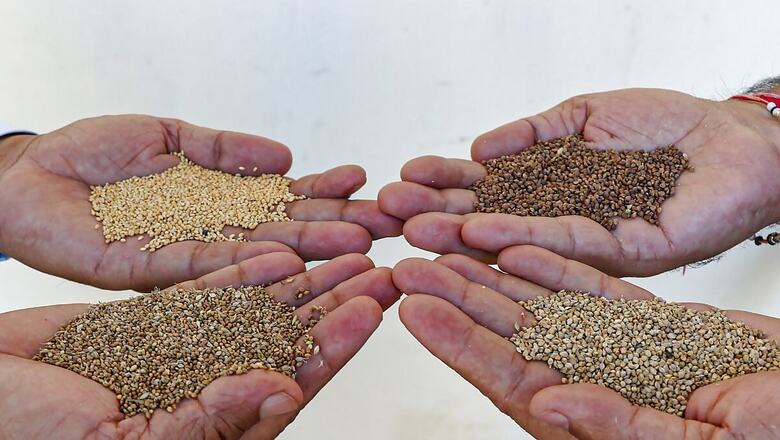
views
2023 was the International Year of Millets. The ‘Shree Anna’ is not only beneficial for the human body but is also helping make small, marginal and female farmers atmanirbhar (self-reliant) and economical sound.
Speaking to News18 on the sidelines of ‘Shaping Perspectives on Practice and Policy for Millets in India’ held on Tuesday, Reliance Foundation CEO Jagannatha Kumar said that the organisation is trying to revive millet farming in areas that were historically known for naturally growing millets, but over the years, because of incentives on other crops and ease of growing other crops, switched to wheat and paddy.
“The programme basically is part of our rural transformation plan. We are working with the farming community across various states in the country. Different states have different conditions and there is no size that fits all. We choose to work in some of the difficult areas, particularly the rain-fed areas, because that is where the farming community needs more support in terms of overcoming these challenges, including livelihood,” he said.
He said that the primary focus is on small and marginal farmers and women, and helping them in earning sustainable livelihood through millet farming.
“Through the process, we are also ensuring that there is climate resilience because these are climate friendly apart from other health benefits for the community,” Kumar added.
Millets have more fibre and protein than wheat and rice. “If these small-scale farmers consume the ‘Shree Anna’, they will stay healthier as well.” But the issue, he highlighted, is that rice and wheat are available at subsidized rates and those growing millets will end up selling their produce and will eat rice and wheat as they are cheaper.
“They are selling more nutritious food (millets) outside and end up eating less nutritious food (wheat and rice). So it has adverse effects on health. Price per calorie for rice and wheat is a lot lower than the price per calorie when you consume millet because millets don’t enjoy that status of subsidy, availability and affordability,” he said.
Kumar went on to say that farmers switched from millet farming because in one hectare of land, one can get six quintals of millets, while in the same land, they can grow 27 quintals of wheat and 35 quintals of paddy.
“But one has to realise that the kind of resources needed to grow wheat and paddy are a lot more than that for millets,” he said, adding that the Indian Institute of Millets Research has come out with the research that one can turn around a millet crop in just 60 days while wheat and paddy take longer.
Since 2010, Reliance Foundation, through its rural transformations programme, has been working at multiple points of the agricultural value chain towards sustainable agriculture, strengthening food systems, enhancing smallholder resilience and nutrition, working across India.
Through this work, the Reliance Foundation has also been engaging in and promoting millets, from production to processing, market linkages along with efforts to recognise women’s contribution to the value chain and work across millets, including kodo, kutki, pearl millet, sorghum, finger miller, and foxtail millets in different states.
The organisation’s efforts on millets include various initiatives to enhance access to quality seed for farmers, creating and strengthening market linkages, and improving agronomic practices by leveraging technologies, focusing on diversifying farms and diets sustainably while ensuring that women are equal partners and beneficiaries of the millet value-chain and creating awareness of the benefits of millets and the impact that millets can have for communities.
Also this year, across the larger Reliance ecosystem, Reliance Retail held a two-month Maha Millet Mela, a first-of-its-kind millet festival organised across 400 Reliance Retail stores in India, towards promoting the goodness of millets and bringing them to many more households across the country.
Overall, Reliance Foundation’s work on millets aims to work in partnership to help foster self-reliant rural communities and lead towards thriving and sustainable economies.



















Comments
0 comment